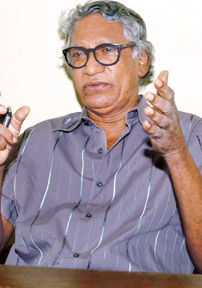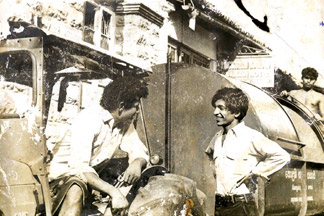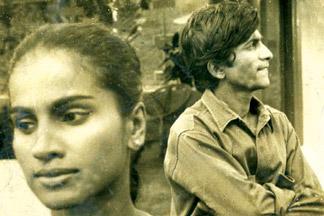|

Rebel with a cause
Amalshan GUNARATHNE
Nourishing the Sri Lankan silver screen with his radical
authenticity, he fuelled an artistic transformation that paved the way
for a new tide of aesthetic cinema. For that reason he was called as a
ĎRebel with a Causeí. His unique cinematic expressions had the capacity
to capture and recreate social realties of his times in a manner that
would leave the audience with a sense of aesthetic enlightenment.
Successfully representing Sri Lankan cinema at Moscow and Los Angeles
film festivals, he went on to compose a lineage of critically acclaimed
films that inspired a refreshing change in Sinhala cinema. His feature
films, One League of Sky (Ahas Gawwa), Coming of Age (Eya Den Loku
Lamayek), Ponmani, The Wasps are Here (Bambaru Avith), On The Run (Paradige)
and Old Soldier (Soldadu Unnehe) won hearts of many and earned him great
critical praise. The creator of such cinematic masterpieces, the veteran
film-maker Dharmasena Pathiraja is our Encounter of the Week.
|

Dharmasena Pathiraja
|
Q: Can you go back down memory lane and recall some of your
precious memories about how you started your journey as a filmmaker?
First feature film I did was One League of Sky (Ahasgawwa). It took
me four years to complete that film. I didnít have enough money to
produce the film, so I got financial backing from some of my close
friends. Those days we had a very strong film society movement, headed
by people like Regi Siriwardana, Gamini Haththotuwagama. Also while I
was studying at Peradeniya University, we had an active film society
where we studied new trends in films, we studied French, Polish,
Hungarian films and that initial background played a major role at
paving my way to my success.
Q: When making films, dramas and other such works of art,
artistes often strive to express radical, ideological messages through
their creations. Is it possible to bring out that kind of message
through a medium like cinema?
Artist is not a messenger. True, it is artistís responsibility to
penetrate in to issues of the society that he lives, do indepth analysis
and recreate and reconstruct the reality of the society that he lives.
And when they depict certain social realities, a serious work of art
often end up becoming an anti-establishment work. But it shouldnít be
direct.
It is not about making direct statements. Whatever that the artist is
trying to convey, has to be conveyed aesthetically. The artist job is
not to make people suffer. The audience should get a sense of
fulfillment and a sense of aesthetic pleasure. It doesnít mean you have
to put everything to please people. These days, directors look at things
only from entertainment perspective, but what they do is not art.
Q: You have extensively studied the works of film-makers such
Solana, Polanski, Jean Luc Goddard, etc, how did their work inspired
your creative work?
 |
|

Scenes from Ahas Gawwa |
Film is an inter-textual medium. That intertextuality does inspire
you. Your inspirations do have something to do with other films. I was
close to east European Cinema and I was influenced by the style and the
technique used by those directors, but ideologically I was different. So
when I made Ahasgawwa, I wanted to explore issues of our society, may be
I was inspired by their technique and adapted some of those in to that
film, but I didnít adapt their films and the story was mine.
Q: You have represented Sri Lanka successfully at many
esteemed international film festivals. But some of the recent films that
successfully represented Sri Lanka at international film festivals have
either been censored or banned here in Sri Lanka, your thoughts on the
dilemma.
True, film-makers like Vimukuthi, Ashoka Handagama and Prasanna
Vithanage are recognized internationally. But sadly most of their
creations are censored or banned here in Sri Lanka. Even films like
Prasanna Vithanageís Purahanda Kaluwara had trouble before screening.
Internationally acclaimed films like Aksharaya, Sulanga Enu Pinisa were
also banned. Vimukthi makes films only for international audience now.
Some say, those directors make films only for festivals. But if they can
make films for good festivals and compete with international directors,
it is a good thing. You have to compete with them and learn, that is how
you can develop cinema.
Q: Express your thoughts on the current trends of local cinema
One of the major trends that we had in recent times was war films.
The way I see it, those are not anti-war films, they are anti-national
films. All they do is glorify war. After winning of the war whole line
of films came up which revolves around this theme. It is fine to do a
film based on various issues arisen by war, but it should not be used as
a medium to glorify war. These people are taking war as narrative and
are creating a Sinhala Buddhist ideology. I think mentally and
emotionally they are trying to militarize the society which is not good.
The other major trend was the big-budget films that revolve around
Buddhist, historical storylines. Those films are bit like Vesak Pandals.
They have nice visuals, lights and glamour, so because of that people go
to watch those films. The storyline is very simple and the theme
revolves around something as simple as the conflict between good and
bad. People feel good about watching these films, it is bit like going
to see a Vesak Thoran and listening to its narrative, so to get that
same viewing pleasure, they go and watch them. But these films canít be
considered as good works of art. It is fine to recreate films based on
historical stories. Even Sarachchandraís Maname was adapted from a
Jathaka story. But it was a good drama with great aesthetic value and it
became a timeless creation. Same cannot be said for recent adaptations.
Q: What should we do to create a new breed of Sri Lankan
Cinematographers that could take Sri Lankan cinema forward?
Films studies are not properly taught here. The film studies canít be
done in a class room environment. You need practical experience and that
practical exposure should be given to students.
And also we donít have enough good tutors who can teach the subject.
These days they have diplomas to teach film studies everywhere, but
those are there only to earn money. There is demand for such courses,
people want to learn, but we donít have a capable system that can
facilitate such programmes. |



